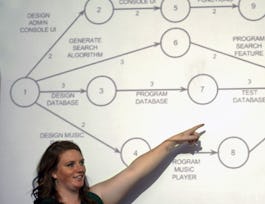This course covers practical techniques to elicit and express software requirements from client interactions.


Client Needs and Software Requirements
This course is part of Software Product Management Specialization
Taught in English
Some content may not be translated

Instructor: Kenny Wong
72,869 already enrolled
Included with 
Course
(3,086 reviews)
94%
What you'll learn
Create clear requirements to drive effective software development
Visualize client needs using low-fidelity prototypes
Maximize the effectiveness of client interactions
Adapt to changing product requirements
Skills you'll gain
Details to know

Add to your LinkedIn profile
7 quizzes
Course
(3,086 reviews)
94%
See how employees at top companies are mastering in-demand skills

Build your subject-matter expertise
- Learn new concepts from industry experts
- Gain a foundational understanding of a subject or tool
- Develop job-relevant skills with hands-on projects
- Earn a shareable career certificate


Earn a career certificate
Add this credential to your LinkedIn profile, resume, or CV
Share it on social media and in your performance review

There are 4 modules in this course
Welcome to the first module! In this module, you will become familiar with software requirements and some issues surrounding them. You will learn what a software requirement is, including the different types of requirements. Then, you will learn how to deal with changing requirements and control project scope, as well as how requirements affect design. These lessons will give you the knowledge you need to move on to eliciting and creating good quality requirements in the next modules.
What's included
11 videos6 readings2 quizzes
A major duty of a software product manager is eliciting and expressing requirements from your client. This module will walk you through the basics of client interactions and requirements elicitation and expression. You will learn how to create the best product for your end users, how to conduct productive client meetings, and various ways of expressing requirements. These techniques will provide you with the tools you will need to confidently interact with your client as well as satisfy them with the “right product”.
What's included
9 videos3 readings1 quiz1 peer review
Explore the many ways in which software requirements can be represented. In this module, you will learn about the most popular means of expressing requirements in the industry today: the user story. You will learn how acceptance tests help to verify the stories which they accompany, and how to create a robust product backlog. At the end of the module, you will learn how story maps are used to organize user stories, so that you’re always putting your effort into the tasks which makes the most impact.
What's included
8 videos3 readings1 quiz1 peer review
To this point, you have learned how to effectively elicit, express, and prioritize requirements. It’s now time to ensure clarity. This last module will explore the activity of analyzing requirements in greater detail. Analyzing creates clear, actionable, requirements which result in high quality software with fewer errors.
What's included
4 videos6 readings3 quizzes
Instructor

Offered by
Recommended if you're interested in Design and Product

University of Alberta

University of Alberta

University of Alberta

University of Alberta
Why people choose Coursera for their career




Learner reviews
Showing 3 of 3086
3,086 reviews
- 5 stars
80.95%
- 4 stars
16.03%
- 3 stars
2.46%
- 2 stars
0.38%
- 1 star
0.16%
New to Design and Product? Start here.

Open new doors with Coursera Plus
Unlimited access to 7,000+ world-class courses, hands-on projects, and job-ready certificate programs - all included in your subscription
Advance your career with an online degree
Earn a degree from world-class universities - 100% online
Join over 3,400 global companies that choose Coursera for Business
Upskill your employees to excel in the digital economy
Frequently asked questions
Access to lectures and assignments depends on your type of enrollment. If you take a course in audit mode, you will be able to see most course materials for free. To access graded assignments and to earn a Certificate, you will need to purchase the Certificate experience, during or after your audit. If you don't see the audit option:
The course may not offer an audit option. You can try a Free Trial instead, or apply for Financial Aid.
The course may offer 'Full Course, No Certificate' instead. This option lets you see all course materials, submit required assessments, and get a final grade. This also means that you will not be able to purchase a Certificate experience.
When you enroll in the course, you get access to all of the courses in the Specialization, and you earn a certificate when you complete the work. Your electronic Certificate will be added to your Accomplishments page - from there, you can print your Certificate or add it to your LinkedIn profile. If you only want to read and view the course content, you can audit the course for free.
If you subscribed, you get a 7-day free trial during which you can cancel at no penalty. After that, we don’t give refunds, but you can cancel your subscription at any time. See our full refund policy.

